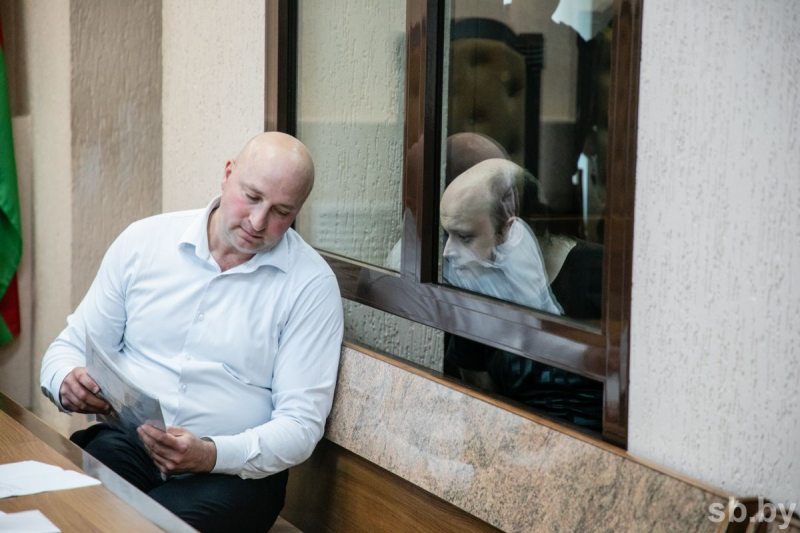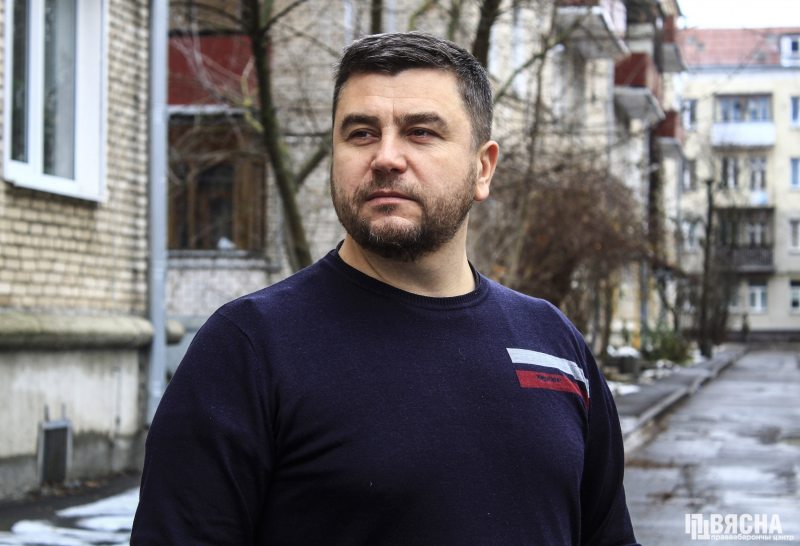The Rico Krieger case: we have collected everything that is known
On June 24, a 29-year-old employee of the German Red Cross, Rico Krieger, was sentenced to death in the Minsk Regional Court. In Belarus, he was charged under six serious articles of the Criminal Code, including for "an act of terrorism" (Part 3 of Article 289 of the Criminal Code). Despite the fact that the trial was partially held in open session, the circumstances of the case have to be collected bit by bit from various sources. Viasna has collected everything that is known about the Rico Krieger case, and Andrei Paluda, coordinator of the Human Rights Defenders against the Death Penalty campaign, comments the prospects.
When and how was Rico Krieger detained?
According to Viasna, Rico Krieger has been in custody since October 6, 2023. But his persecution became known only from the court schedule, when the first meeting was scheduled. Official agencies did not report anything about the detention of the German citizen. It was only on July 22 that one of the propaganda Telegram channels reported that Krieger was detained on October 13, 2023. It was also reported that Krieger arrived in Belarus as a tourist on October 2, 2023, and was soon detained.
How was the trial held and what was the German citizen accused of?
The trial was held in open session, but some of the case materials were heard in closed session. The trial was handled by a judge of the Minsk Regional Court Aleh Lapeka with the participation of people's assessors. The state prosecution was supported by a representative of the Prosecutor General's Office Tatsiana Hrakun. Krieger does not speak either Belarusian or Russian, so an interpreter participated in the process. Lawyer Uladzimir Horbach defended the German citizen. Remarkably, the former does not specialize in criminal cases. As reported on the website of the Bar Association, since 2013, Horbach has been "providing legal assistance mainly to business entities of the Republic of Belarus in the economic process." But at the same time, it is noted that he speaks German to the extent "sufficient to provide qualified assistance in economic matters to enterprises from Germany."
At trial, Krieger reportedly pleaded guilty to "agency activity." He refused to testify.
The trial began on June 6 and lasted for 12 sessions. The verdict was handed down on June 24.
Rico Krieger was charged under six serious articles of the Criminal Code at once. Let's try to figure it out.
"An act of terrorism" (Part 3 of Article 289 of the Criminal Code), "intentional disrepair of a vehicle or communication lines" (Part 4 of Article 309 of the Criminal Code), "illegal actions with respect to firearms, ammunition, and explosives" (Part 4 of Article 295 of the Criminal Code)
According to Viasna, Rico Krieger was found guilty of "arranging an explosion in order to influence decision-making by authorities, intimidate the population, destabilize public order (an act of terrorism) arranged by a person who had previously committed a crime under Part 4 of Article 295 of the Criminal Code, as an organized group, that is, committing a crime under Part 3 Article 289 of the Criminal Code". On the basis of it, Krieger was sentenced to the death penalty (execution by firing squad).
According to EADaily, Krieger is involved in sabotage "in the Russian-Belarusian-Ukrainian border area." This is what Nasha Niva wrote. Only on July 22 did it become known that Krieger's case concerns the explosion at the Aziaryščy railway station at around 11 p.m. on October 5, 2023. The evidence during the trial was the testimony of the taxi driver who drove Krieger, the testimony of the accused, also during the verification of testimony at the location, the results of examinations, recordings from video surveillance cameras, information from his phone, correspondence, and other sources. It is reported that Krieger was supposed to conduct reconnaissance and photograph railway facilities in this area on the instructions of the Security Service of Ukraine.
As the campaign Human Rights Defenders against the Death Penalty reminds, the death sentence has already been passed in Belarus under Part 3 of Article 289 of the Criminal Code. This is a high-profile case of the explosion in the Minsk metro in 2011. Then 25-year-old Dzmitry Kanavalau and Uladzislau Kavaliou were sentenced to death. Four months after the sentencing, they were shot.
"But then the situation was completely different, since those events were associated with the death of people. Now we say that the convict became a victim of changes to the Criminal Code in April 2022. Now according to Part 3 of Article 289 of the Criminal Code, people can be sentenced to death for arranging an explosion even without victims," says campaign coordinator Andrei Paluda.
The human rights defender also recalls that earlier in Belarus all death sentences were imposed in cases involving the murder of one or more people.
"Agent activity" (Article 358-1 of the Criminal Code)
According to the propaganda Telegram channel, Krieger entered Belarus as a tourist with phones and a drone.
"That's what was said in the assignment that [he] received earlier from the Security Service of Ukraine. It also said to conduct reconnaissance and to photograph objects in Asipovičy by coordinates."
Probably, Krieger was tried for this under Article 358-1 of the Criminal Code (agent activity).
"Joining an extremist formation in order to commit an extremist crime"(Part 3 of Article 361-1 of the Criminal Code) and "mercenary activity" (Article 133 of the Criminal Code)
Human rights activists also learned that the case of the German citizen concerns the Kalinoŭski Regiment, namely its structural unit: the foreign mechanized Western Unit. This information is confirmed in propaganda Telegram channels.
As it was reported on July 22, no later than September 20, 2023, Kalinoŭski Regiment "dragged" Krieger in "as the direct perpetrator of crimes in the Republic of Belarus, including terrorist attacks under their leadership."
It should be noted that this was the first trial in Belarus for "mercenary activity".
What is known about the convict?
Rico Krieger is 29 years old; he was born in Berlin. He worked as a rescue medic at the German Red Cross. It is known that the man has a minor child. It is also known that Rico Krieger previously worked as a special security officer at the US State Department in Berlin, where he gained experience in Armed Security Operations. After this position, he moved into healthcare, worked as a nurse and specialized in emergency medical care.
What do the Belarusian and German Foreign Ministries say?
For about a month, human rights activists were not aware of the result of the trial. On June 20, the Belarusian Foreign Ministry confirmed the verdict against the German citizen and reported that consultations between the foreign ministries of the two countries are underway.
As the German Foreign Ministry reported in response to a request from Deutsche Welle, the department and the German Embassy in Minsk are providing consular assistance to convicted Rico Krieger and are intensively working with the Belarusian authorities in his interests.
"The death penalty is a cruel and inhuman form of punishment that Germany rejects under any circumstances," the German Foreign Ministry said in the response.
Foreign Ministry spokesman Anatol Hlaz said:
"Of course, there were contacts with the German side on this issue. This criminal is a German citizen and we understand the concern for him from the German side.
In full compliance with international norms and bilateral agreements, the Belarusian side has provided consular access to this person.
Taking into account the request of the German Foreign Ministry, the Belarusian side has proposed specific solutions for the available options in the development of the situation. Consultations on this issue are conducted through the Ministries of Foreign Affairs of the two countries."
What are the prospects for the case?

- Rico Krieger. Photo: sb.by
It is suggested that Rico Krieger may be exchanged for a Russian FSB officer Vadim Krasikov, who is serving a life sentence in Germany.
Campaign coordinator Andrei Paluda suggests that Krieger's defenders have filed it.
"The practice shows that even if a person sentenced to death refuses to file an appeal against the sentence himself, his defenders do it. Lawyers usually use this opportunity. Although, of course, there may be different scenarios."
The human rights defender draws attention to the fact that at the stage of hearing of the appeal, the verdict may be changed or the case sent for a new review.
"The fact that the case was handled in less than a month — in 12 meetings — is an important circumstance. After all, it's very fast for such a case."
Nevertheless, on the evening of July 22, it became known from propaganda channels that Krieger did not appeal the sentence has taken effect.
Andrei Paluda also reminds that Rico Krieger can avoid execution in Belarus because of a pardon from Lukashenka. In 2021, this happened to the brothers Illia and Stanislau Kostseu from Čerykau: their death sentences were commuted to life imprisonment.
"Therefore, it is impossible to say that this is unrealistic. It can happen. I think that consular work may be underway in this direction. But if there is a pardon, it will only be replaced by life imprisonment."

"An exceptional case." The coordinator of the campaign "Human Rights Defenders against the Death Penalty" spoke about the sentence of Rico Krieger


